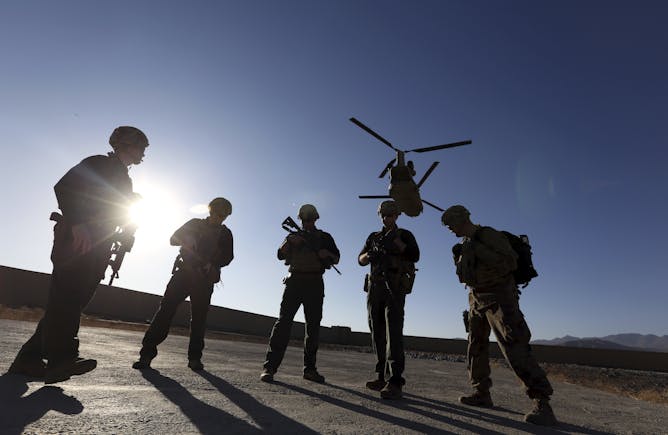|
|
|
|
Here is what our coverage today of the crisis in Afghanistan is not about: It is not about political figures trashing the president or how 2022 midterm campaigns will use the messy exit as a cudgel against opponents. And there are no pundits opining about the “optics” of what is going on.
What we offer instead is trenchant analysis. Two experts – one a scholar long-experienced in foreign affairs, the other a security policy and politics analyst – provide critical insights on the history of the Afghanistan conflict and how over two decades it led, ultimately, to the terrible images of chaos and death we have seen over the past few days.
Gordon Adams, of the American University School of International Service, ranges through three failed wars fought by the U.S. – Vietnam, Iraq and Afghanistan – and concludes that the same motivating force led the country into all of them: hubris. “Afghanistan is now the poster child for the sense that the U.S. can remake the world,” writes Adams, who calls that belief “delusional.”
UMass Lowell scholar Arie Perliger complements Adams’ analysis. He notes that U.S. involvement in Afghanistan stemmed from a misguided approach “in which military seizures of territory are intended to fight international extremist movements and ideologies.” The problem, writes Perliger, is “military organizations are not equipped or trained” to build democracies and political institutions.
Also today:
Tomorrow afternoon at 4:00PM EDT/1:00PM PDT, The Conversation will be hosting a webinar on the topic of “Women’s Transformative Power in Higher Education and Beyond” with three leaders in the field. You can find out more and RSVP here.
|

|
Naomi Schalit
Senior Editor, Politics + Society
|
|

U.S. troops in Afghanistan had better equipment, training and funding than the Taliban.
AP Photo/Rahmat Gul
Arie Perliger, University of Massachusetts Lowell
It may be attractive to think that promoting democracy in occupied foreign countries is an appropriate moral and effective path for restoring security and stability. But it’s not accurate.
|
Politics + Society
|
-
Gordon Adams, American University School of International Service
Secretary of State Tony Blinken said that the US Afghanistan pullout is not a repeat of failures in other recent wars. “This is not Saigon,” he said. A seasoned foreign policy expert disagrees.
|
|
Health
|
-
Danielle Wallace, Arizona State University
New research shows correctional officers are vectors of infection, driving COVID-19 rates both inside prisons and in their communities.
-
Wayne A. Beach, PhD, San Diego State University
New studies highlight the difficulties cancer patients have when discussing their illness with family and medical teams.
-
Adolfo Martinez Valle, Universidad Nacional Autónoma de México (UNAM); Felicia Marie Knaul, University of Miami
COVID-19 cases in Mexico are approaching the highest levels seen during the second wave in late January 2021, with about 22,000 new infections a day. A slow vaccine rollout is stunting progress.
|
|
Ethics + Religion
|
-
Eric M. Vanden Eykel, Ferrum College
Mary has acquired popularity among celebrities of late. A religion scholar writes about how for nearly 2,000 years, the mother of Jesus has been viewed as an exemplar by different Christian groups.
|
|
Economy + Business
|
-
Kosali Simon, Indiana University; Sharon Tennyson, Cornell University
Two economists explain what insurers can and can’t do to factor vaccination status into their coverage and rates.
|
|
Education
|
-
Joni Lakin, University of Alabama
Gifted education has long faced accusations of being elitist and excluding students of color. Will new changes prepare more students for elite colleges, or will they water down current curriculums?
|
|
Environment + Energy
|
-
Jory Brinkerhoff, University of Richmond
How bad are ticks this year? An expert explains why tick-borne diseases are on the rise.
|
|
Science + Technology
|
-
Francois Barthelat, University of Colorado Boulder
Fish fins are extremely flexible yet also strong. A special segmented fin design is the key to this useful combination of properties and could inspire new morphing materials.
|
|
Trending on site
|
-
Catesby Holmes, The Conversation
The Taliban ‘expect a complete handover of power.’ Experts explain who the Taliban are, what life is like under their rule and how the US may bear responsibility for Afghanistan’s collapse.
-
Hanif Sufizada, University of Nebraska Omaha
Because the Taliban’s insurgency is so well financed, the Afghan government must spend enormous sums on war, too. A peace accord would free up funds for basic services, economic development and more.
-
C. Michael White, University of Connecticut
In an effort to reduce costs, drugmakers and dealers often cut, or adulterate, recreational drugs with substances that have been banned by the FDA.
|
|
| |
| |
| |
| |

|
| |
| |
| |
| |
| |
| |
| |
| |
|
|
|
|
|
|
|